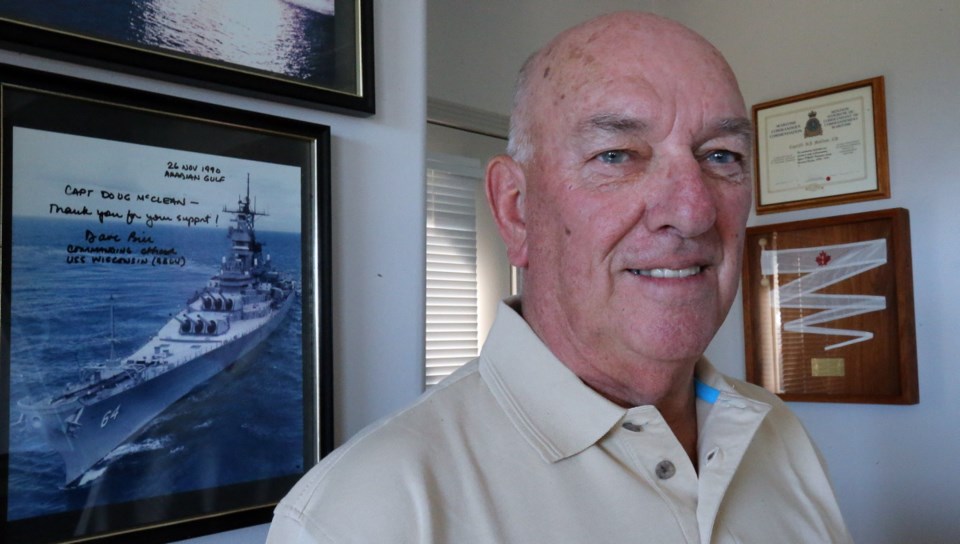News that the Royal Canadian Navy is retiring the incapacitated HMCS Protecteur didn’t surprise Doug McClean. But it did mark the end of an era for its former captain.
McClean spent three years at the head of the Protecteur-class auxiliary oil replenishment ship, leading it into the Gulf War and on humanitarian aid missions before docking it in its final home of Esquimalt.
“I feel like a little piece of me is there, for sure,” he said.
The retirement also leaves a conspicuous void in the navy’s fleet that McClean said hasn’t seen the government support it needs.
Protecteur sustained serious damage in a fire in February, and had to be towed to Esquimalt from Pearl Harbor, Hawaii. About six months earlier, it sustained damage to its bow after colliding with HMCS Algonquin during an exercise at sea.
The navy said Friday that four ships had reached the end of their operational lives. Also being decommissioned are HMCS Preserver, another replenishment ship, and the guided-missile destroyers HMCS Algonquin and HMCS Iroquois.
For McClean, who was promoted to commodore before retiring, serving aboard Protecteur remains the highlight of his military career. The Gulf War conditions in 1990, in particular, provided a sharp learning curve. It was the first time Canada had deployed to a war zone since the Korean War in the 1950s. “You got a chance to see if you were as good as you thought you were,” he said.
Only six weeks after taking command of the ship, McClean had to find ways to accommodate a crew that grew to 500 from 240, fit four helicopters in a hangar built for three and learn how to operate new weapons systems that hadn’t been used.
“We had Xeroxed copies of manuals we were poring over to figure out exactly how they worked,” he said.
Among the threats that kept him up at night: Saddam Hussein’s two types of anti-ship missiles, which targeted ships in different ways. Iraq’s Mirage aircraft fired Exocets, while its MiGs fired Silkworms. McClean described Protecteur, packed with fuel, as a “Roman candle” waiting to be lit.
“We had 43 seconds from the time we could detect the launch to figure out which missile it was,” McClean said.
Protecteur was the only replenishment ship in the Gulf during its eight-month deployment, McClean said. It was affectionately called the “chuckwagon,” for the way it supplied fuel to ships from France, England, Australia, the Netherlands, Norway and Canada.
In 1992, McClean took Protecteur to Miami, where Hurricane Andrew had carved a path of destruction with 260-kilometre-an-hour winds. As commander of the Canadian contingent, he led crews that rebuilt and repaired devastated schools.
“They reopened the schools and a Canadian flag was flying. These are all African-American kids from the poorest part of Miami, which, wouldn’t you know it, was nailed by the hurricane. They sang O Canada, without the words in front of them, perfectly,” McClean said. “It was one of those moments you don’t forget.”
While McClean agreed that it was time to retire both Protecteur and Preserver, he said the Harper government’s slow progress to replace them leaves Canada vulnerable. The ships’ replacements are not scheduled to be completed until 2019 at the earliest.
“We’re in a very bad situation, there’s no question about that,” McClean said. “Those are four extremely valuable warships that have been taken away from us.”
Protecteur and Preserver, commissioned in 1969 and 1970 respectively, are so old that they break many rules of the sea, he said. They both have single-sided oil tanks, which pose a high risk of leaking if punctured. He said the retirement of both vessels leaves Canada without an auxiliary oiler replenishment ship in its fleet, which will hamper the mobility of its other warships.
A positive step is the mid-life conversion process underway for Halifax-class frigates, McClean said, even if it is overdue.
“Those ships are coming out and they’re wonderful, absolutely state-of-the-art. But it’s a long process,” he said.
> Islander: Life on HMCS Calgary, D1



